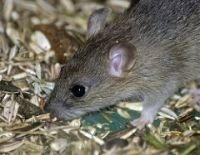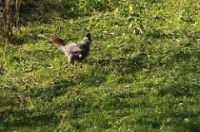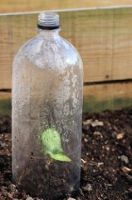Tips To Protect Your Organic Garden From Mice
 Mice can be a real pain in the vegetable garden and can quickly nibble away all of your hard work. They are especially of concern in the spring, when tender young seedlings and sown seeds can quickly disappear overnight and you can be left back at square one! Most organic gardeners are happy to 'pay their taxes' and share a little of their produce with the creatures that share their space, but when they leave you with nothing, that can become a big problem.
Mice can be a real pain in the vegetable garden and can quickly nibble away all of your hard work. They are especially of concern in the spring, when tender young seedlings and sown seeds can quickly disappear overnight and you can be left back at square one! Most organic gardeners are happy to 'pay their taxes' and share a little of their produce with the creatures that share their space, but when they leave you with nothing, that can become a big problem.
In rural and town settings, mice can often be a fact of life and there is little point in trapping and removing the creatures as the mice will often simply return from far away and even if you dispatch the mice you catch, more are likely to arrive to fill their space. Sometimes, if you are noticing mice, this means that there is some kind of imbalance in the local ecosystem. Before you work out ways to safe your garden crops, it is also a good idea to think about how that imbalance might be addressed. The simplest and best way to reduce mice numbers is always to introduce or encourage more of their natural predators.

 Natural predators for mice include owls – so make sure your garden is owl friendly and consider providing good spaces for owls and other mice-eating birds to nest. Strangely, keeping chickens may also be a solution – these greedy birds eat just about anything, including garden pests like slugs and, yes, even mice. Foxes may also eat mice – though if you have pet chickens, you will not want to encourage Mr Fox to pay a visit! Whatever you do, do not poison the mice as this may also poison the predators and can worsen the problem in the long term as there will be fewer creatures left to eat the mice that remain.
Natural predators for mice include owls – so make sure your garden is owl friendly and consider providing good spaces for owls and other mice-eating birds to nest. Strangely, keeping chickens may also be a solution – these greedy birds eat just about anything, including garden pests like slugs and, yes, even mice. Foxes may also eat mice – though if you have pet chickens, you will not want to encourage Mr Fox to pay a visit! Whatever you do, do not poison the mice as this may also poison the predators and can worsen the problem in the long term as there will be fewer creatures left to eat the mice that remain.
 Even if everything is nicely in balance, however, you can still suffer the odd mouse attack in your vegetable beds. In order to reduce the impact of rodents eating your seeds, it can be a good idea to sow seeds indoors and plant out your seedlings once the seeds have germinated. You can then simply cloche your seedlings to prevent mice and other pests from having a go. The good thing is that you can cloche plants for free using household plastic waste – drinks bottles cut in half are ideal.
Even if everything is nicely in balance, however, you can still suffer the odd mouse attack in your vegetable beds. In order to reduce the impact of rodents eating your seeds, it can be a good idea to sow seeds indoors and plant out your seedlings once the seeds have germinated. You can then simply cloche your seedlings to prevent mice and other pests from having a go. The good thing is that you can cloche plants for free using household plastic waste – drinks bottles cut in half are ideal.
Clearing up piles of debris and clutter close to your vegetable garden can also help to reduce problems with mice by encouraging them to nest elsewhere. It is a good idea, however, to retain brush piles for wildlife in a more remote section of your garden and to give rodents plenty of native berries etc. to eat so they are less interested in eating your food.